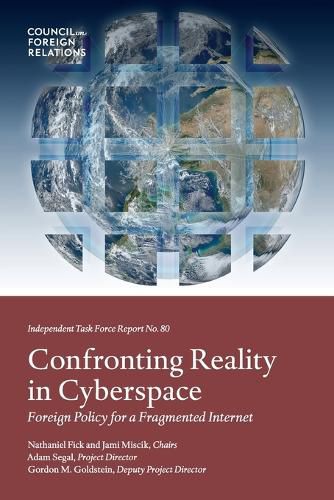Readings Newsletter
Become a Readings Member to make your shopping experience even easier.
Sign in or sign up for free!
You’re not far away from qualifying for FREE standard shipping within Australia
You’ve qualified for FREE standard shipping within Australia
The cart is loading…






The early advantages the United States and its allies held in cyberspace have largely disappeared as the internet has become increasingly fragmented, more dangerous, and less free. China and Russia in particular are working to export their authoritarian models of the internet around the world. While freedom on the internet declines, threats in cyberspace grow. Cybercrime and cyberattacks on critical infrastructure have cost billions of dollars worldwide and disrupted thousands of lives. And while the U.S. response has focused on domestic policy and resilience, more attention should be paid to rethinking a vision of foreign policy for cyberspace. Confronting Reality in Cyberspace: Foreign Policy for a Fragmented Internet outlines a strategy founded on three pillars: building a trusted internet coalition, employing more targeted pressure on adversaries and establishing pragmatic cyber norms, and getting the U.S. house in order.
The Council on Foreign Relations sponsors Independent Task Forces to assess issues of current and critical importance to U.S. foreign policy and provide policymakers with concrete judgments and recommendations. Diverse in backgrounds and perspectives, Task Force members aim to reach a meaningful consensus on policy through private deliberations. Once launched, Task Forces are independent of CFR and are solely responsible for the content of their reports. Task Force members are asked to join a consensus signifying that they endorse the general policy thrust and judgments reached by the group, though not necessarily every finding and recommendation. Each Task Force member also has the option of putting forward an additional or a dissenting view.
$9.00 standard shipping within Australia
FREE standard shipping within Australia for orders over $100.00
Express & International shipping calculated at checkout
The early advantages the United States and its allies held in cyberspace have largely disappeared as the internet has become increasingly fragmented, more dangerous, and less free. China and Russia in particular are working to export their authoritarian models of the internet around the world. While freedom on the internet declines, threats in cyberspace grow. Cybercrime and cyberattacks on critical infrastructure have cost billions of dollars worldwide and disrupted thousands of lives. And while the U.S. response has focused on domestic policy and resilience, more attention should be paid to rethinking a vision of foreign policy for cyberspace. Confronting Reality in Cyberspace: Foreign Policy for a Fragmented Internet outlines a strategy founded on three pillars: building a trusted internet coalition, employing more targeted pressure on adversaries and establishing pragmatic cyber norms, and getting the U.S. house in order.
The Council on Foreign Relations sponsors Independent Task Forces to assess issues of current and critical importance to U.S. foreign policy and provide policymakers with concrete judgments and recommendations. Diverse in backgrounds and perspectives, Task Force members aim to reach a meaningful consensus on policy through private deliberations. Once launched, Task Forces are independent of CFR and are solely responsible for the content of their reports. Task Force members are asked to join a consensus signifying that they endorse the general policy thrust and judgments reached by the group, though not necessarily every finding and recommendation. Each Task Force member also has the option of putting forward an additional or a dissenting view.